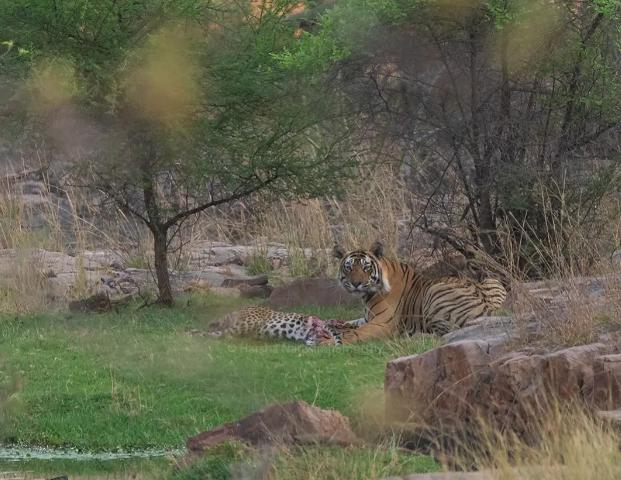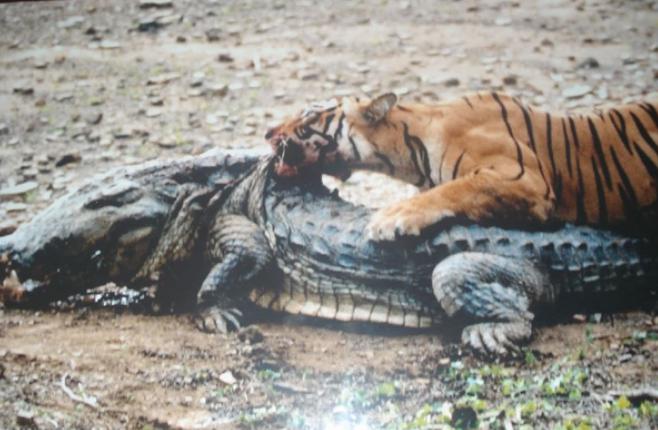Cat Man Catches Two Cats On Camera
Known as The Cat-Man, the wildlife photographer Harsha Narasimhamurthy shared his experience on social media platforms. He said that he got an opportunity while holding a photo tour. “Witnessed one of the most incredible natural history moments today ( June 2) at Ranthambhore while guiding our toehold.photo tour.” “As we entered Zone 4 we came across this handsome tiger feeding on a leopard kill which he probably made last night or earlier this morning. We were extremely lucky to see this rare sight of a predator feeding on another predator , after a good 15 minutes of feeding , he dragged the kill further deep into the nullah and vanished”, writes Harsha.
There is high density of leopards in Ranthambore and the one consumed by the tiger on June 2 must have been an unfortunate one. But Harsha is not the only one who has experienced some of the most wonderful wildlife moments and this was not for the first time that a tiger had killed a leopard. Such incidents were also reported in the past from other places, but there was hardly any photo opportunity. In case of Ranthambore, the prospects of getting good wildlife pictures are more , and this makes this jungle different.
Machli Immortalized After Video of Fight With Monster Croc
Remember the amazing picture – a video grab- from an amateur video of Machli, one of the most photographed big cats, of Ranthambore. The tigress was seen fighting with 14 feet long fierce crocodile piercing her canines deep into the monster’s body . The cause of the fight might have been a common prey in the lake where Machli had encountered equally fierce reptile. The video with over 35 lakh views on You Tube was shot by an unknown person. Popularity of Machli soared after this video and the wildlife lovers world over started calling her “Crocodile Killer”. So Ranthambore gives ample opportunities both to the professionals and armatures. A conservation biologist , Dharmendra Kandhal who works with the Tiger Watch in Ranthambore for long explained the “why” factor. The forest type, its terrain and proximity of the forest to the golden triangle of tourism comprising Delhi, Agra and Jaipur make the park different. “It is extension of the golden triangle of tourism ”, he said.
Also read: Game Hunting by Maharajas to Bushmeat Poaching: Blackbucks killed in Thousands
But the main reason seems to be the forest type. “The Ranthambore national park is a dense tropical dry forest located in one of the driest regions of the country. Though it is located at the edge of a plateau between the Banas River and the Chambal River, no perennial river passes through it. The park however, has many lakes and narrow valley. It is a raw bush and grassy meadowland.” Unlike Sariska national park located on Aravalli range, there height of the hills here is almost half as compared to those in Sariska. “All these factors facilitate the visibility of the wild animals which are very cooperative and do not shy with the tourists leading to excellent picture opportunities.” Besides, some talented wildlife photographers like Aditya Singh settled down in Ranthambore also contributed to some astonishing wildlife images. Remember his series of pictures of a tiger fight with bear with the bear beating the big cat in the end. Aditya and his wife Poonam made Ranthambore their home long back. Recently National Geographic also recognized their work in a documentary earlier this year.
Banner Image: Harsha Narasimhamurthy




